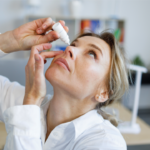
Skin disease is a global public health problem that often has physiological, psychological, and social impacts. Acne and eczema, including atopic dermatitis (AD), the most common form of eczema, are among the most common chronic skin conditions that significantly impact the quality of life in people of all ages.
ACNE 50MILLION PEOPLE (eight in 10 teens and adolescents)
ECZEMA 31.6 MILLION PEOPLE
AD 17.8 MILLION PEOPLE
Acne vulgaris is a chronic inflammatory skin disease in which the sebaceous glands that lubricate the skin become clogged, causing a bacterial overgrowth of Propionibacterium acnes. People who experience acne most commonly develop blackheads, red and tender bumps or pimples on the face, neck, shoulders, chest, or upper arms.
AD is commonly referred to as eczema – a dry, scaly, itchy rash. The relentless itch causes sleep disturbances in about 60% of the cases, and insomnia can lead to fatigue, lethargy, lack of motivation, and depression. There is also a risk of secondary infections from endless scratching.
Common Causes of Acne and Eczema/AD
The Role of the Skin-gut Axis
Several factors are involved in disrupting the skin microbiome, including stress, chemicals in skin products and the environment, overuse of hand sanitizers, UV radiation, pollution, and more. The skin is the largest organ in the body, and it is a first-line barrier for immune defence, and an essential link between the internal body and the outer environment. Most skin conditions are accompanied by an altered skin-gut microbiome balance, referred to as dysbiosis. Dysbiosis is associated with increased gut and skin barrier permeability, allowing foreign substances to enter the bloodstream and leading to the inflammation, rashes, and lesions involved in common skin disorders. The importance of the skin microbiome has gained significant attention in dermatology in recent years.
The Effects of Stress
Psychological stress and other stressors, including environmental and lifestyle factors, affect skin inflammation. Acute stress causes the immune system to react by increasing inflammatory markers as an initial defence, but prolonged stress leads
to chronic inflammation in the body and brain. Food allergens, such as cow’s milk, gluten products, eggs, and soy, are often the most significant stressors contributing to skin disorders. Plus, a diet high in junk food, reduced consumption of fruit and vegetables, and deficiency of omega fatty acids are also linked.
Supplement Support for Acne and Eczema/AD
- ZINC helps in connective tissue formation, maintains healthy skin, supports immune function, and reduces skin inflammation.
- VITAMIN D regulates the immune system, protects the skin’s barrier function, and prevents inflammation common in most skin disorders.
- OMEGA-3: Studies suggest that supplementation with 1.8 g of omega-3 daily has reduced scaling, itching, and overall severity of skin lesions.
- PROBIOTICS: A recent meta analysis found that treatment with a mixture of different probiotic bacterial species is an effective addition to the management of inflammatory skin disorders.
- VITAMIN E is an antioxidant that works by limiting the formation of free radicals, thereby decreasing inflammation and injury to the skin. According to a four-month study, participants who received 400 IU of vitamin E daily experienced significant improvements in eczema severity and symptoms like itching compared with a control group.
- BERBERINE HCL is effective in the treatment of insulin sensitivity and metabolic syndrome. Acne is common in people with insulin dysregulation, and studies have shown that when blood sugar is regulated, hormones are stabilized, and there are fewer acne breakouts.
Topical Treatments
- TEA TREE OIL has antibacterial properties with the potential to kill P. acnes, the bacteria that causes acne. It also has anti-inflammatory properties that help reduce the swelling and redness of pimples. Follow directions when using tea tree oil.
- THE ROLE OF THE SKIN-GUT AXIS Several factors are involved in disrupting the skin microbiome, including stress, chemicals in skin products and the environment, overuse of hand sanitizers, UV radiation, pollution, and more. The skin is the largest organ in the body, and it is a first-line barrier for immune defence, and an essential link between the internal body and the outer environment. Most skin conditions are accompanied by an altered skin-gut microbiome balance, referred to as dysbiosis. Dysbiosis is associated with increased gut and skin barrier permeability, allowing foreign substances to enter the bloodstream and leading to the inflammation, rashes, and lesions involved in common skin disorders. The importance of the skin microbiome has gained significant attention in dermatology in recent years.
- THE EFFECTS OF STRESS Psychological stress and other stressors, including environmental and lifestyle factors, affect skin inflammation. Acute stress causes the immune system to react by increasing inflammatory markers as an initial defence, but prolonged stress leads to chronic inflammation in the body and brain. Food allergens, such as cow’s milk, gluten products, eggs, and soy, are often the most significant stressors contributing to skin disorders. Plus, a diet high in junk food, reduced consumption of fruit and vegetables, and deficiency of omega fatty acids are also linked. Common causes of acne and eczema/AD
- APPLE CIDER VINEGAR (ACV) contains malic, citric, lactic, and succinic acids, all of which have been shown to kill acne causing bacteria. Succinic acid has been shown to decrease inflammation; lactic acid can improve skin texture by exfoliating dead skin cells; and malic and other acids help balance the pH of the skin, which is normally acidic. This helps keep harmful bacteria in check.
- COCONUT OIL contains lauric acid, which is known to have antimicrobial and anti-inflammatory effects, and it has been shown to protect the skin barrier. Adding vitamin E to coconut oil increases both their benefits.
In addition to the supplements and topical treatments mentioned, a healthy diet of fruits and vegetables, whole grains, good quality protein, and drinking 6−8 glasses of water per day can prevent and help manage most skin conditions.












